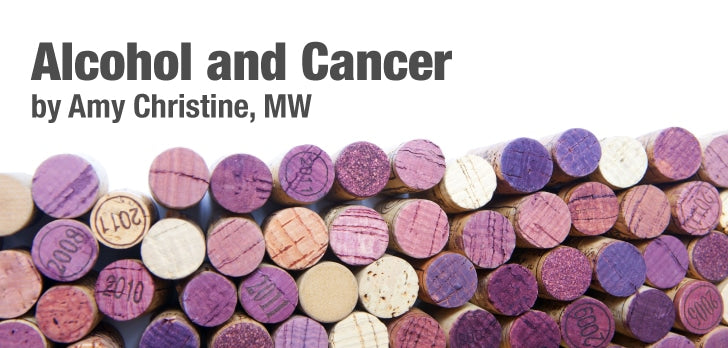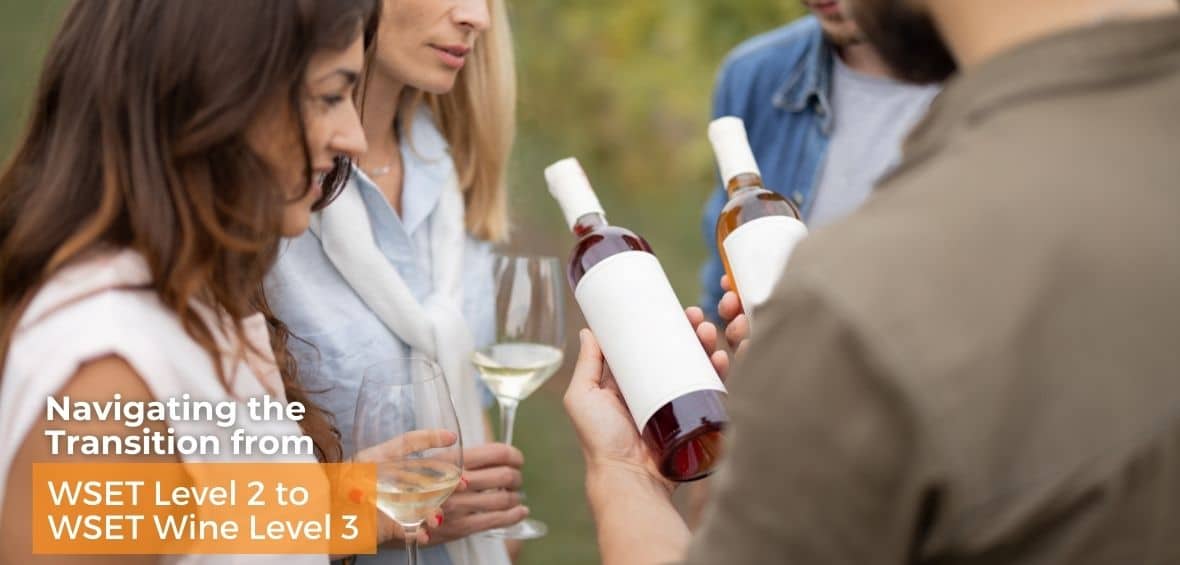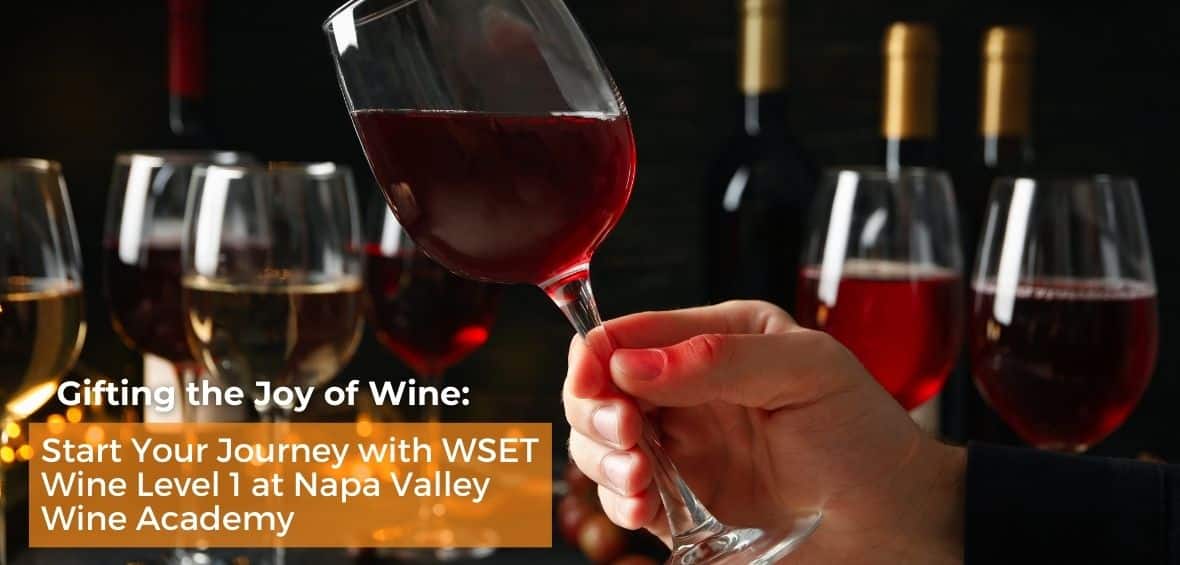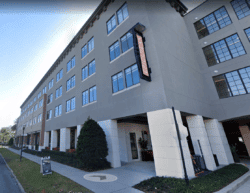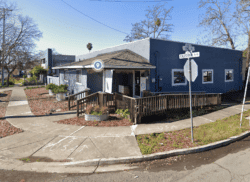A Master of Wine’s Study of the Relationship Between Alcohol and Cancer
Amy Christine MW has a personal story to share (in three parts) about wine and her experience with cancer. All three parts are included here, and we encourage you to read them in one sitting. It’s also important to note that the views expressed by the author are hers alone and may not reflect the views of the Napa Valley Wine Academy.
Part 1
As I lay in bed early on a Saturday morning, or a Sunday morning, or any morning really, my Instagram feed is a traffic jam of bottle shots; overachievers posting a row (or two rows) of bottles that showcase an epic night of consumption of the world’s finest wines. You know them. #sommlife #winelover #winelife #winestagram #instawine #winegoals #wineoclock #wineporn. Between bottle shots, I come across Boomerang pics of various people drinking wine out of a glass, out of a can, out of a shoe (I jest, but seriously what won’t we drink wine out of on Instagram?) and straight out of a bottle in a continuous loop. Tilt and drink, tilt and drink, tilt and drink. You get the picture. #wineboomerang
I am concerned that we are in denial as an industry regarding the potentially harmful effects of alcohol.1, 2 I have two friends who are fond of saying, “We are all functioning alcoholics.” I entirely disagree with this assessment of myself and my friends (well, most of my friends). It’s not an ok thing for members of the trade to say to each other or to the general public. What is our responsibility as sales reps, as wineries, as importers, as distributors, as retailers, as sommeliers in discussing the downside(s) of drinking?3
I want to point out that I am not a teetotaler. As a matter of fact, as Microsoft Office just pointed out to me, I don’t even know how to spell that word. I spent seven years of my life studying to be a Master of Wine. For four of those years, I began blind tasting drills between 6:00 am and 7:00 am (spitting, of course) every day. When I passed the exam in 2013, I hated wine so much that I moved on to a steady evening diet of gin martinis. In other words, until four years ago, I drank wine or something alcoholic virtually every night of my adult life. Meaning—not a teetotaler. Then, I had an unlucky encounter with a doctor who provided me with facts in what seemed like an attempt to ruin my carefree boozy life.
Three years ago, I was assigned a new doctor in my HMO healthcare system. I was in for a routine annual physical when the doctor asked me how many alcoholic drinks I consumed per week. I told her fourteen. I knew it was more than that, but I have a rule that you can’t tell your doctor or therapist the full truth. Partial truths allow for less judgment. You don’t want to appear unhealthy to your MD or insane to your therapist. I did a simple calculation. I split a bottle of wine with my husband, or a friend, nightly. That equals two drinks a day, seven days a week.
“Fourteen drinks,” I said confidently.
Because I am fond of lying to doctors, that calculation did not include the beer we may have split or the tiny Hendrick’s martini we may have had before we cracked the bottle. (I promise it was a TINY martini, though now that I’ve told you I lie about these things, I suppose I am not a trusted narrator.) Fourteen was my final answer.
My doctor swiveled around in her chair and said, “I am alarmed.”
I said, “Alarmed?”
She said, “Fourteen drinks a week is a dangerous amount of alcohol to consume.”
I was chagrined, “I think I drink pretty moderately compared to some other people I know in the wine business!” Then I backtracked and said, “It’s probably only ten. Ten drinks a week. Only sometimes fourteen, and even when it’s fourteen, it’s probably only thirteen. So thirteen drinks I’d say. Or ten. Or like, how many am I supposed to say?
She said, “The rates of addiction in the wine and spirits industry are alarming.”
I said, “You think I’m an alcoholic?”
She said, “Not yet.”
Now I was ALARMED.
She told me to cut back to no more than eight drinks a week. So at the very least, I now knew the right answer for her and all my future doctors. (As an aside, my mentor Pat Farrell, Master of Wine and Medical Doctor, told me that one definition of ‘moderation’ is drinking less than your doctor.” So make sure you get the right doctor.)
Then she told me that she was the Head of Addiction and Recovery at this facility and I thought, “Dammit. What are the chances I would be assigned to this doctor?”
So I went home and proselytized to my industry friends, “Hey, we shouldn’t be drinking every day. It increases our chance of becoming alcoholics.” The response I received back from everyone, and I mean EVERYONE, was that alcoholism was when you couldn’t get up in the morning and go to work and when your relationships were disrupted by alcohol abuse. We were all doing just fine. Wine is good for you! PLUS, the doctor I spoke to was biased. She could only see alcohol through addiction. Enjoy your life. Stop being so anxious about everything.
Nevertheless, I was still anxious about everything. Whether the doctor was biased or not, her point was well taken. The conversation with this particular doctor happened in November of 2015. Out of fear and anxiety, I had a relatively sober December. My New Year’s resolution for 2016 was not to drink alcohol at least one day a week. In other words, I was scared moderately straight.
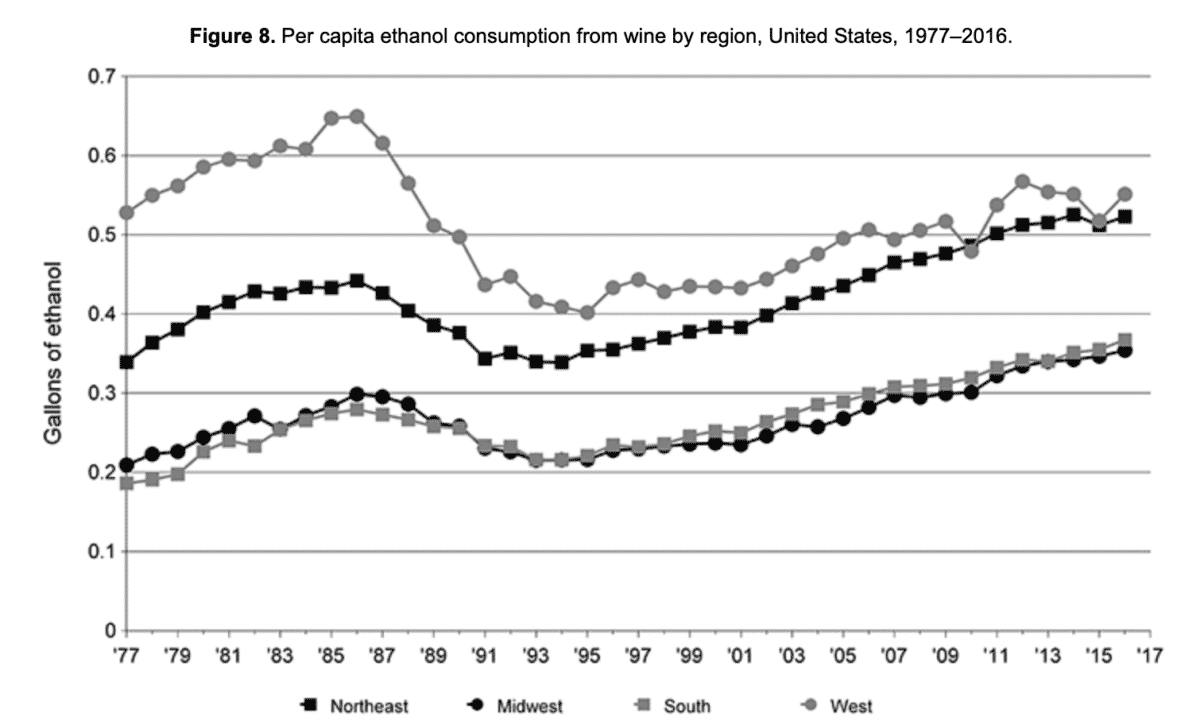
US Per Capita Alcohol Consumption of Wine by Region
Source: National Institute of on Alcohol Abuse and Alcoholism
https://pubs.niaaa.nih.gov/publications/surveillance110/CONS16.htm
Part 2
2016 was a bad year by many accounts (Bowie, George Michael, but mostly Prince :/), but I learned that cutting back on alcohol is entirely possible and altogether enjoyable. By July of 2016 I racked up 52 (non-consecutive) days when I didn’t consume any alcohol. I am a goal-oriented person, and I like data. To facilitate my goal, I would mark the “no-drink” day in my calendar to keep track and exude the appropriate amount of self-righteousness. I stopped adding these events (non-events, really) into my calendar when I hit 75 days. Just as drinking wine nightly had become a habit, not drinking wine nightly was now a habit. I want to reiterate that I was still drinking alcohol, but I was consuming far less than I had in previous years.
2017 was also a terrible year by many accounts, but this is the year where there was an actual event that brings me to the crux of what I want to talk about, which isn’t addiction. It’s cancer.
In October of 2017, I had a mammogram. It was abnormal. I had a biopsy. It was cancer. It was not a lot of cancer. It was just a little bit of cancer, but a little bit of cancer still has to be dealt with. Now, in the spirit of over-sharing, I will tell you that I seem to be cancer-prone. I had Hodgkin’s Disease, a cancer of the lymphatic system when I was 16 years old. Back then, the protocol was to blast the patient’s torso with radiation. They do not do that anymore because this type of “mantle radiation” exposure has long-term side effects, including the development of secondary cancers (i.e., breast cancer) later in life.
My treatment for Hodgkin’s was successful, and since the mid-1990s, I have been a part of a series of long-term follow-up studies for childhood cancer survivors through St. Jude’s hospital. The data from these studies estimated my risk of getting breast cancer at around 40%.4 In other words, this diagnosis was annoying, but it was no big surprise. It was also no great tragedy. I wasn’t going to die from this breast cancer. I had a mastectomy in January of 2018. I am fine.
Part 3
Now, why in the hell am I telling you all this? Because before my breast cancer diagnosis, I had become aware of the literature on the link between alcohol consumption and breast cancer. I mostly ignored it, waiting for an opposing study to be published that would reveal that alcohol consumption lowers a women’s risk for breast cancer. Sadly, that study never came. More affirmative studies appeared. I couldn’t ignore them. In the back of my mind, I wondered, with great consternation, if I had inadvertently, out of willful ignorance, contributed to this diagnosis by drinking wine every day for 20 years.5 I was 44 years old when I was diagnosed, well below the average age of breast cancer diagnosis, which is 62.6 While radiation to the chest is a significant risk factor in developing breast cancer, I wasn’t doing myself any favors in the risk reduction department by consuming alcohol daily. I beat myself up about it. In case you are wondering, mastectomies are not fun. So how much was I putting my one remaining non-cancerous breast at risk by consuming wine regularly?
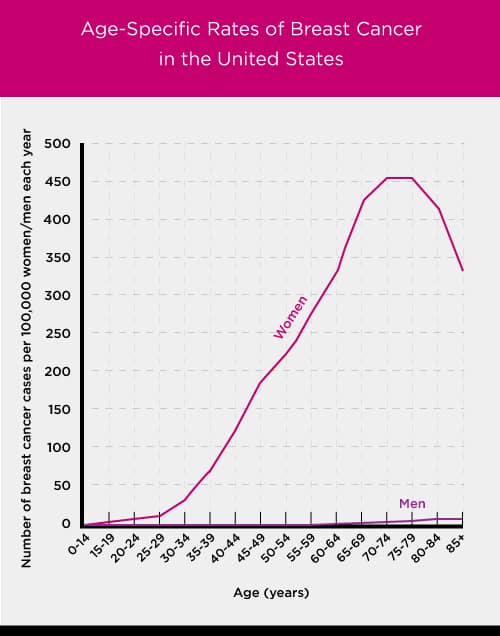
Age-Specific Rates of Breast Cancer in the United States
Source: Susan G. Komen
https://www.komen.org/breast-cancer/risk-factor/age/
Before I go on, I want to say that this is a very complex issue for me. It’s not just about my health. For better or worse, wine is my life’s work. I own a winery. I have a 30-year lease on a vineyard that produces grapes to make wine, to sell to people so that they drink it. Also, I do not exaggerate when I say that I have the world’s greatest sales job with Kermit Lynch Wine Merchant. Most of my friends are in the wine and restaurant business. Will talking openly about the risks of alcohol consumption and cancer harm my relationship with them? Will it hurt sales? SHOULD it hurt sales? Will it displease my employers (including my husband)?
To lessen my anxiety about cancer and wine, or increase it, both of which I apparently like to do, I made it a bit of a mission to educate myself. I called my mentor Pat Farrell, MD, MW. Yes, you read that correctly. He’s a medical doctor and a Master of Wine. We want to share the research, the science, the facts, and none of the alternatives. It is truncated and simplified to help make reading it touch easier.7
Breast cancer
On average, a woman has about a 12% risk of developing breast cancer in her lifetime.8 The World Cancer Research Fund in 2017 published a study9 that estimates one drink a day increases that risk by about half a percent. Not so bad. Two drinks a day increases that risk to about 14%. Three or more drinks per day increase that risk to almost 19%. I am no math whiz, but if I do some calculations, there is a 63% increase in risk for developing breast cancer with the consumption of three or more drinks per day compared to the average risk of developing breast cancer. The risk is still below 20%, which means there is an 80% chance your alcohol consumption will not result in breast cancer. So roll the dice however you like. Just know that many, many, many studies show a link between alcohol consumption and breast cancer.10 , 11
How and why does alcohol increase the risk of breast cancer? It appears that alcohol increases the production of estrogen. Increased estrogen can be a catalyst for breast cancer. Also, according to a World Cancer Research Fund study, alcohol increases the production of acetaldehyde.12 Acetaldehyde damages cell DNA. When cell DNA is damaged, it prevents that cell from being able to repair itself. The development of cancer is linked to this phenomenon. There are other possible mechanisms, as well. Wine had been used for centuries as a solvent. One can dissolve compounds in alcohol, especially fat-soluble compounds, that won’t dissolve in water. This mechanism of alcohol may allow carcinogens to enter cell membranes.
I must state that obesity13, family history, and a sedentary lifestyle14 are more significant risk factors for breast cancer than alcohol consumption. I’ve cited only two studies here, but there are many.15, 16 Alcohol stimulates appetite, which can yield weight gain, which increases the risk for a host of cancers. However, after my breast cancer diagnosis, when I asked a geneticist if I could have more than one drink a day if I went for a couple of extra runs a week, he laughed and said, “It doesn’t really work that way.” To which I replied, “You’re a real buzz kill. No pun intended, but you are.” I then argued that drinking wine made me happy and reduced stress, so surely there was a benefit in that regard. Less stress = less cancer. He laughed and said, “It really doesn’t work that way.” To which I replied, “I am really, really serious about that buzz kill comment.” My anxiety about giving myself breast cancer was not abated.
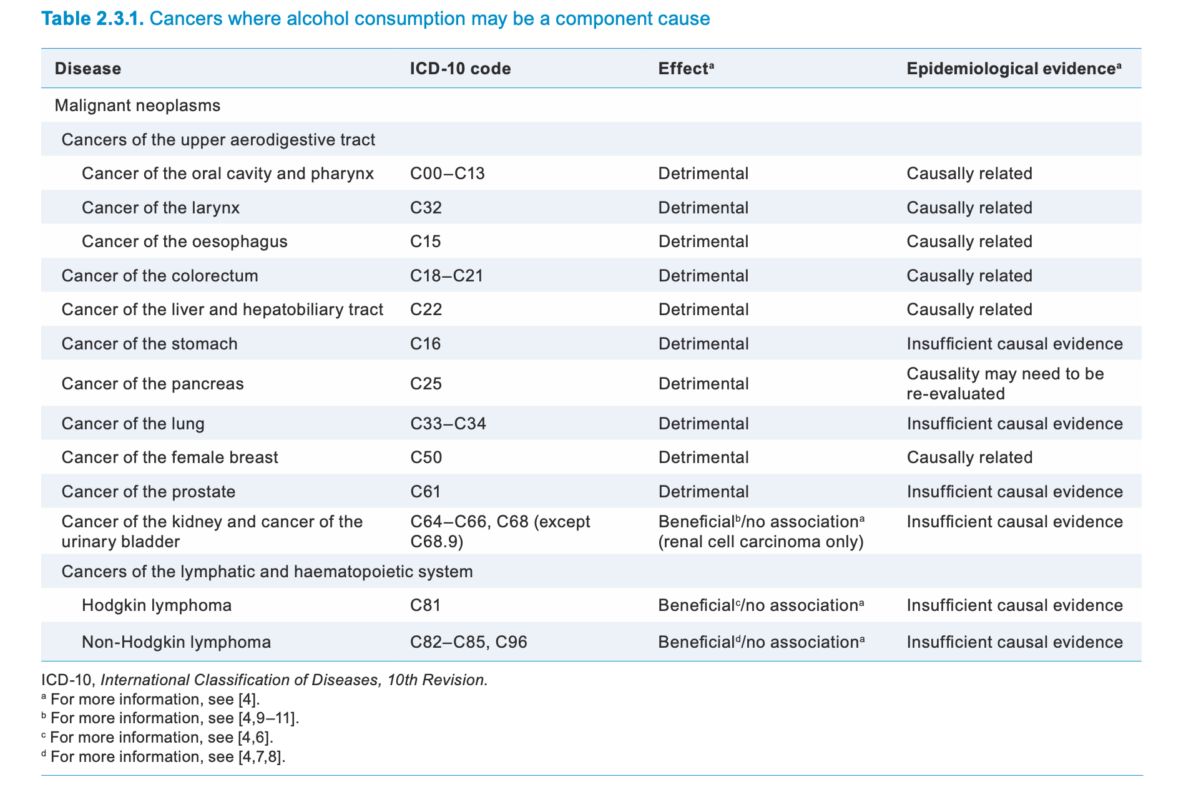
Cancers where alcohol consumption may be a component cause
Source: International Agency for Research on Cancer
https://www.iarc.fr/wp-content/uploads/2018/07/WCR_2014_Chapter_2-3.pdf
Head and Neck Cancer
Tobacco is the major extrinsic cause of mouth and throat cancers, especially chewing tobacco. However, a study published by the Journal of the National Cancer Institute in 2007 showed that among those who never smoked, but consumed three or more alcoholic beverages a day, there was an increased risk of developing head and neck cancers compared to a control group of non-drinkers. The World Cancer Research Fund points out that the reason for this is that our mouth and tongue absorb chemicals in alcohol, and this, not surprisingly, increases the risk of mouth cancers.
Colon and Rectal Cancer
A comprehensive meta-analysis of cohort studies was undertaken in 2006, showing a link between what they deem as “high” alcohol consumption and colon and rectal cancers. Low alcohol consumption relative to the study population was considered between 15-140 grams per week (about 0.5-5 ounces – as an aside, who drinks half an ounce of wine a week?). For every 100 grams (about 3.5 ounces) of alcohol consumed over that low consumption rate per week, the research showed a 15% increase in the incidence of colon and rectal cancers. For fun, let’s say most of us consume the equivalent of 2 bottles of wine a week (I would surmise that the majority of people in the wine trade consume significantly more than that). That’s about 50 ounces, which increases your risk of colon cancer by 210% over the low consumption rate in the study. If you keep doing the math as the ounces increase, it gets real ugly real fast.
Liver
This is not breaking news. Alcohol (aka wine) isn’t great for your liver. Cancer that starts in the liver (aka primary liver cancer) has a strong association with alcohol consumption. If you consume more than 2.5 ounces of alcohol a day for more than ten years, your risk of hepatocellular carcinoma increases five-fold. That said, in the US, the risk of primary liver cancer is relatively small compared to other cancers. There are about 325 million people in the US. In 2018, it was estimated that 42,220 adults would be diagnosed with hepatocellular carcinoma. If my math is correct, that is .01% of the population. Increasing that five-fold still means that statistically speaking, there is still less than a 1% chance that you will develop a primary liver cancer that’s not related to another cancer. The liver is a hearty organ, but perhaps we should show it some sober love now and then.
Going beyond cancer for a moment, the liver is the primary organ involved in alcohol metabolism. According to the article quoted above published by the National Institute of Health, a man has to consume a relatively large amount of alcohol daily, a liter of wine or equivalent, over a long period of time, 20 years, in order to cause severe and life-threatening liver damage. Now, ladies, I am sorry to say, it looks like a woman can have the same results as a man in the liver damage department by consuming far less than a liter a day: a half or a ¼ of that. That means you could be doing damage to your liver with just a couple of glasses of wine a day. I am not being alarmist. I am just presenting the data. The flip side is that you could drink a liter of wine every day of your life for 40 years, and nothing may happen to you at all!
So what are we to do????
Conclusion
I’ll tell you my personal solution to this conundrum. Channel Michael Pollan. Drink wine, not too much, mostly the good stuff. In other words, drink less, but drink better. Take a second to do the math. If you consume two drinks a night for a year, that’s 730 drinks a year. SEVEN HUNDRED AND THIRTY DRINKS!!!! Over 20 years, that’s 14,600 glasses of wine! What if we cut back a mere four drinks a week? Take two days off from consumption altogether or reduce intake to one glass a night for four of those nights? That reduces our intake to 520 glasses of wine a year, a HUGE reduction really, almost 30%. Your liver will thank you. Your colon will thank you. Your breasts will thank you.
For the record, I am not telling anyone not to drink. The only person I can tell what to do, by law, is my husband. (I told him this was listed on the marriage certificate, and to my knowledge, he hasn’t double-checked the accuracy of my assertion.) I still consume wine 4-5 days a week, though I’ve decided not to drink gin martinis (well, maybe on occasion) for no scientific reason. The research shows all alcohols are created equal in both studies that show benefits of consuming alcohol moderately and those that show increased cancer risk. I have also become a fan of the michelada. I figure Pacifico and tomato juice won’t kill me (though I’m sure there is a study lurking around the corner that says it will). I want to end this by saying, live your life however you want. Just live it informed. And if you take away only one thing from this article, just remember that the correct answer is ‘eight.’ But say ‘seven’ just in case.
1 http://www.who.int/news-room/fact-sheets/detail/alcohol
3 https://theconversation.com/and-now-the-bad-news-red-wine-is-not-great-for-health-after-all-26488
4 https://www.ncbi.nlm.nih.gov/pmc/articles/PMC4100937/
5https://www.motherjones.com/politics/2018/04/did-drinking-give-me-breast-cancer/
6 https://ww5.komen.org/BreastCancer/GettingOlder.html
7 https://www.iarc.fr/en/media-centre/iarcnews/2016/WCR_2014_Chapter_2-3.pdf
8 Howlader N, Noone AM, Krapcho M, et. al. (eds). SEER Cancer Statistics Review, 1975–2009 (Vintage 2009 Populations), National Cancer Institute. Bethesda, MD, 2012. Retrieved September 7, 2012.
9 https://www.wcrf.org/sites/default/files/Breast-cancer-report.pdf
10 https://monographs.iarc.fr/wp-content/uploads/2018/06/mono96-6B-06.pdf
11 https://ww5.komen.org/BreastCancer/Table3Alcoholconsumptionandbreastcancerrisk.html
12 https://www.wcrf.org/sites/default/files/Alcoholic-Drinks.pdf
13 https://academic.oup.com/endo/article/150/6/2537/2456047
14https://www.ncbi.nlm.nih.gov/pmc/articles/PMC6723386/
17 The studies are simply too numerous to cite. Here is a link to Google scholar. You can peruse at your leisure. https://scholar.google.com/scholar?hl=en&as_sdt=0%2C5&q=tobacco+and+mouth+cancer&btnG=
18 https://pubmed.ncbi.nlm.nih.gov/17505073/
19 https://onlinelibrary.wiley.com/doi/full/10.1002/ijc.22299
20 https://pubs.niaaa.nih.gov/publications/arh21-1/05.pdf
21 Rimm Eric B, Klatsky Arthur, Grobbee Diederick, Stampfer Meir J. Review of moderate alcohol consumption and reduced risk of coronary heart disease: is the effect due to beer, wine, or spirits? https://www.bmj.com/content/312/7033/731
22 https://www.cancer.net/navigating-cancer-care/prevention-and-healthy-living/alcohol
23 https://www.epicurious.com/recipes/food/views/classic-michelada

